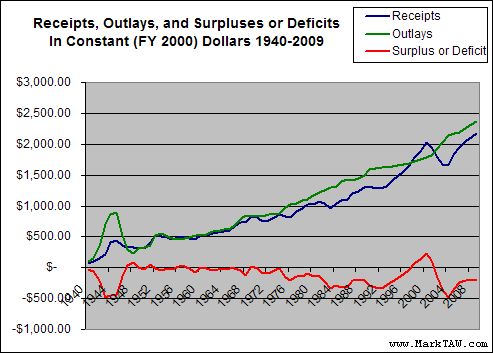Borrow and Spend
While Bush is castigating Democrats as being “tax and spenders,” let’s look at an interesting statistic about the Bush administration. And mind you, this is from a year and a half ago:
According to the Treasury Department, from 1776-2000, the first 224 years of U.S. history, 42 U.S. presidents borrowed a combined $1.01 trillion from foreign governments and financial institutions, but in the past four years alone, the Bush administration borrowed $1.05 trillion.
I have a feeling that those figures are not adjusted for inflation, but I’ll bet you that the Bush Debt still stands up respectably even after that; it would be hard to believe that any president in history has put us deeper in debt than Bush, save possibly for Reagan. For a good explanation with a chart, check out this page.
The expression “tax and spend” is a successful, time-tested political attack meme; as I noted a few posts back, it doesn’t apply to Democrats nearly as well as conservatives want it to. But in a sense, the very nature of government is tax-and-spend. How else do you finance a government that does what we want it to? As for taxes, whatever happened to the principle of paying for what you get? At least Democratic politicians try to stand up for that principle.
A much worse paradigm is what Republicans have generated since Reagan, what Bush has so excelled at: borrow and spend. One would think that a core conservative value would be to pay for what you get. Maxing out your credit card is something that you can be sure they’d like to apply to liberals, but it is conservatives who have mastered the art.
Remember when Clinton actually balanced the budget and a surplus was at hand? Remember what Republicans then said we should do? Tax cuts! Why? Because it is unthinkable that the government is taking in more than it immediately spends each year. Republicans painted this as an atrocity. Democrats, meanwhile, bending to the idea of tax cuts as much as they had to, nevertheless pushed for a crazy, wild-eyed idea: paying off the national debt. Conservatives then bent to that idea as much as they had to, but once they had full power, they abandoned that concept with relish, and started maxing out the national credit card like there was no tomorrow.
Because Republicans are fiscal conservatives. Because they know what’s best for the economy. Because Democrats are fiscally irresponsible. Because the Democrats will tax us out of existence and spend us into the poorhouse.
Nice when political memes describe reality so precisely, isn’t it? All you have to do is reverse the terms, of course. Small detail.
Update: These charts shows the trends pretty clearly:

Focus on the red line at the bottom of the chart: that shows deficits. You can see some deficit problems happening at about the time of the Vietnam War, but a few big deficits started a trend in the Ford administration. Carter turned that around in 1976 and brought the deficits down a bit, but a few years into Reagan’s term, the deficits started getting really big. The Reagan deficits continued, more or less, until the end of Bush 41’s term. And then with Clinton, you see a sharp line, a definite trend upwards towards balancing the budget. That’s Clinton erasing the deficits. Then you get to 2001, and bam, Bush 43 drives debt up hard, leading us into record deficits unseen since WWII. Things have improved a little in the past two years or so, but the deficits still are at a level as bad as the worst Reagan deficits. Republicans try to explain this off by saying that Reagan and Bush 41 were really responsible for giving Clinton a good economy, and Clinton was responsible for giving Bush 43 a bad one. But this cannot explain the overall trends that match so perfectly with entire administration lifetimes. One administration can set the trend for a year or two into the next president’s term, but not for the following eight.
The disparity between Democratic and Republican administrations would be sharper still if you were to look at the figures in terms of budget gains and losses relative to administration starting points. You can see similar patterns in job growth in this post, which demonstrated how the worst-performing Democratic presidents created more jobs than the best-performing Republicans.
So, tell me again, exactly how did Republicans get the reputation for being economic geniuses?
